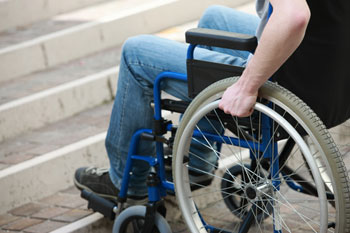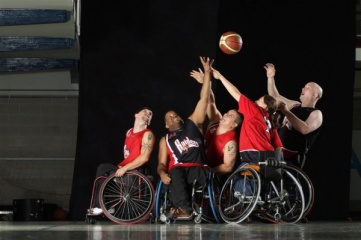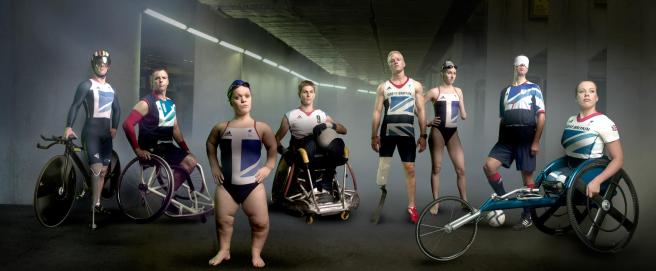For a few weeks ever four years, the British public talk about the ‘inspiring’ athletes who have overcome adversity to win us another haul of medals. And don’t get me wrong, they are inspiring. As a sports lover, who is also disabled, I like watching people I can identify with succeeding in their different disciplines. It pushes me to try harder in what I do, reminds me that I can still achieve, albeit in different directions than those I pursued as an able-bodied person.
But did you realise that some of the difficulties faced by the disabled community could be lessened? Although there is no magic wand to wave and make impairments disappear, there are two main areas which I believe hold back many people with disabilities.
1) Disabled access to leisure activities and shops
It is disappointing how many businesses deny access to disabled people simply through lack of a ramp, braille, or accessible toilets. An audit in December 2014 found that only 15% of businesses reviewed offered hearing loops and 75% of restaurants did not offer a menu printed in braille.
The same audit, commissioned by the MP Mark Harper, stated that 20% of shops did not have a ramp for customers with mobility problems, but I know from experience that even some with ramps are impossible to use unless you have someone accompanying you. Many shops keep a portable ramp tucked away somewhere, but unless the till is near the door how am I supposed to ask a member of staff for assistance? I could shout at the top of my voice, but to be perfectly honest I’d rather not! Even when I’ve had a friend/relative/carer with me to go inside and ask on my behalf, I have discovered that it is not uncommon for the staff to not know whether they have a ramp, where it is kept, or how to correctly place it for me to safely get into the store. I have actually had another customer lift and reposition a ramp as it was unsafe to use.

Changing Places is a charity which campaigns for accessible toilets across the UK. While approximately 40% of shops have no disabled toilets (according to the audit mentioned above), ‘accessible’ often only means no steps and a hand rail or two if you’re lucky. According to Changing Places, a quarter of a million people require more than this. We’re talking about a bed or changing table sturdy enough to hold anyone from a child to an adult, plus a hoist and room for a carer to assist. The alternative is to sit in a wet or dirty incontinence pad, get changed on the (often disgusting) floor, or not to leave home at all.
How many more people would be able to access sports if their local leisure centre had a Changing Places toilet? Or if an inclusive class was offered?
I have had mixed experiences at my own gym – on one hand the trainers are happy to adapt things to allow me to join classes or to help me use the equipment, but on the other hand there is no lift or ramped access to the upper floor. I am left to choose whether to risk a fall on the stairs, or simply miss out on the machines that reside up there. This is not an unusual situation, judging by statistics which emerged this year, showing that only 17% of adults with a long-term health condition take part in sport every week, compared with over 35% of able-bodied people. Yet 83% of the disabled people polled stated that they would like to participate in more sport.
2) Financial restrictions

Accessing sport can be expensive at the best of times, but when you might need specialist equipment (a wheelchair for playing basketball can cost anywhere from £2000 upwards), a carer to accompany you or help with transport, it can be prohibitive. The disablitiy benefit PIP (Personal Independence Payment) is supposed to do what it says on the tin – allow disabled people to live as independently as possible, and to help cover those costs incurred by poor health or disability. It is not so that we can live lives of luxury, it is to aid us to access the same opportunities as an able-bodied person.
PIP is not dependent on your work status. In fact, many people use the money awarded to support themselves to access paid or voluntary work.
However, in the Government’s wisdom, they decided to change the criteria for this benefit. It was a barely concealed attempt to save money in a troubled economy, but it makes no financial sense – and that’s before we even look at the ethics. As I stated above, many people can only access work because they receive PIP and some choose to use the mobility portion of the benefit to obtain an adapted car. When 600,000 people had their benefit reduced or withdrawn during the change from DLA (Disabled Living Allowance) to PIP, a lot of them lost their Motability cars too.
Even some Paralympians themselves have lost their cars due to benefit cuts.
Freya Levy dreamed of competing in the Paralympics, but lack of suitable housing meant she had to drop out of training and lose out on a potential place in the GB wheelchair basketball team. A report in 2015 by Breaking Point found that 70% of disabled people who approached their local authority for help with housing were not offered suitable accomodation.
Think about that for a moment.
Seventy percent of people who were in a position where they had to leave their current home could not be helped by their local authority. They have nowhere suitable to live. This can mean no access to a private bedroom, lack of ability to prepare food safely, or even being unable to use their own bathroom.
If you can’t even have a shower in your own home, how likely are you to participate in sports or hobbies?
So what can we do?
While some Paralympians have spoken out about barriers to accessing sport (here, for example), I believe that a more concerted effort might help those people who are so proud of our athletes to realise that when they vote for benefits cuts they may be preventing future potential medal-winners from acheiving their goals. They are causing the lady down the street to lose her car and subsequently her job. Affecting the teenager who wants to live independently but is forced to sleep in his parents’ living room because there is no accessible housing available and he is too heavy to carry up the stairs now.
Our Paralympic athletes have the attention of the country at the moment, while they are still riding the high of their amazing medal tally from the 2016 Paralympics. It’s not their job to stand up for all disabled people, but if they could lead the charge it might gain us more traction.
This is their chance to speak up, and our chance to listen.

Reblogged this on Rambling Violets and commented:
Wise words from a wonderful friend x
LikeLike